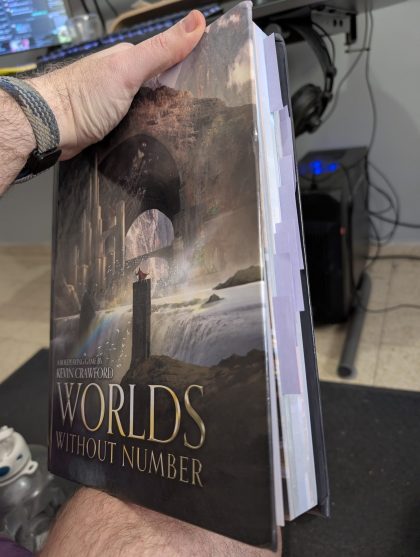Game design, much like the gods in our world of Godflesh, goes through cycles of creation, destruction, and rebirth. After several intense playtesting sessions, our tabletop RPG is evolving in ways I couldn’t have predicted when I first put pen to paper.
Toolboxes for the Imaginative GM
My game design table has recently gained a valuable companion: a physical copy of Kevin Crawford’s “Worlds Without Number.” While I explored both “Worlds Without Number” and “Godbound” for inspiration, the former has become an essential reference for Godflesh development.
Unlike many RPG supplements that focus primarily on rules, Crawford’s work excels at providing GM tools that spark creativity. The tome contains meticulously crafted tables for setting creation, adventure design, and encounter management. I’ve adorned my copy with sticky notes marking particularly useful sections:
- Narrative Combat Challenges: Tables suggesting why conflicts begin, how opponents react when surprised, and what they might do when cornered
- Social Interactions: Ready-made motivations and reactions for NPCs in various situations
- Equipment and Treasure: Quickly generate interesting items beyond the standard “+1 sword.”
- Magic Effects: Organized by rarity, offering effects that feel cohesive yet surprising

In our recent session, these tools proved their worth when a character approached a high-ranking contact. Uncertain how to portray this NPC’s reaction to the players’ requests, I consulted the social interaction tables, rolled, and received the perfect narrative prompt—immediately bringing the interaction to life.
Physical books at the table have proven remarkably more efficient than digital alternatives. Alongside “Worlds Without Number,” I’ve printed sections from “The Action Grimoire” from Legend in the Mist, creating a tangible reference library that doesn’t require scrolling through PDFs mid-game.
Collaborative Faction Dynamics
One of Godflesh’s distinguishing features is its approach to factions. While many games relegate faction moves to behind-the-scenes GM work, Godflesh invites players to participate in determining how these larger forces act in the world.
The system revolves around a “tension” tracker. When players interact with factions or as time passes in-game, tension accumulates. Upon reaching a threshold (currently five points, though playtesting suggests four might be more appropriate), significant events trigger. The group then selects a faction and collaboratively decides what action that faction takes.
These faction actions aren’t mechanical moves requiring dice rolls—they’re purely narrative developments that shape the world:
- Establishing Holdings: A faction might expand its influence through military conquest, bureaucratic maneuvering, trade agreements, or clandestine operations
- Conducting Ceremonies: Public celebrations or rituals that can honour allies or subtly target rivals
- Performing Rituals: Often mystical, with consequences that ripple through the setting
- Formalizing Agreements: Alliances, non-aggression pacts, or resource-sharing arrangements
Each category branches into multiple specific actions, creating a rich tapestry of possible developments. When tensions escalate further, a “radicalisation” system (which I’m considering renaming to “emboldment” for clarity) can trigger even more dramatic actions, such as “incite unrest” or “vilify a leader.”
Fine-Tuning the Core Experience
Playtesting has illuminated several areas where clearer explanations would benefit players. One recurring question involved downtime activities: What can characters do during rest periods without invalidating their recovery?
I’ve added explicit guidance that while resting, characters can still engage in normal, non-dramatic activities. You aren’t confined to bed—exploring town, conversing with NPCs, and gathering information are all perfectly acceptable. The restriction only applies to actions that would trigger dramatic moves requiring dice rolls.
This insight has led to a broader realization: many moves would benefit from having clearly defined “unopposed” versions. In tense situations, gathering intelligence might trigger the “assess situation” move with its attendant risks and possibilities. But in calm circumstances, similar information-gathering shouldn’t necessarily require a roll.
Another important refinement involves how Power interacts with core moves. In Godflesh, Power is a resource derived from magical abilities and artifacts that can be spent to deal damage or resist harm. For combat moves, this Power usage is built into the mechanics—you spend Power to deal more damage or reduce incoming harm.
However, playtesting revealed uncertainty about using Power with non-combat moves like “assess situation” or “figure someone out.” Players wondered if an artifact that enhanced perception could grant benefits to these information-gathering actions. I’m adding clearer guidelines for when and how Power can enhance these moves—perhaps allowing players to spend Power for additional questions or deeper insights, creating meaningful choices about resource management outside of combat.
Other refinements emerging from our playtesting include:
- More transparent guidelines for when Power can enhance specific moves
- Balancing the rate at which factions accumulate tension
The Road Ahead
While Godflesh is already delivering the experience I envisioned, refining it for broader consumption requires addressing blind spots—aspects that seem intuitive to me but might confuse newcomers. Just recently, a player’s question about a particular treasure revealed that my explanation wasn’t nearly as clear as I’d thought.
This is precisely why expanding our playtesting circle is crucial. The upcoming public test version will be more streamlined than the final book, focusing on core mechanics while providing enough context for meaningful play.
Convention sessions and external playtesting will provide invaluable feedback from fresh perspectives, helping identify blind spots that internal testing might miss.
Game design thrives on iteration, and each playtesting session brings Godflesh closer to realizing its potential. The world of fallen gods, ambitious mortals, and cosmic flesh continues to take shape, one playtest at a time.